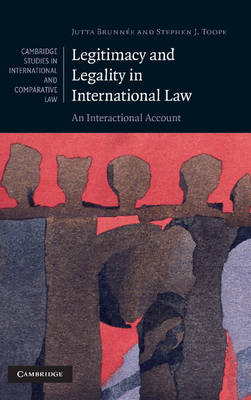
Legitimacy and Legality in International Law
An Interactional Account
Seiten
2010
Cambridge University Press (Verlag)
978-0-521-88065-7 (ISBN)
Cambridge University Press (Verlag)
978-0-521-88065-7 (ISBN)
This new theory of international law focuses on legal obligation as the generator of normative commitment. An interdisciplinary analysis of twentieth-century legal theory and constructivist international relations theory provides compelling examples of interactional international law, with provocative accounts including the climate change regime and the anti-torture norm.
It has never been more important to understand how international law enables and constrains international politics. By drawing together the legal theory of Lon Fuller and the insights of constructivist international relations scholars, this book articulates a pragmatic view of how international obligation is created and maintained. First, legal norms can only arise in the context of social norms based on shared understandings. Second, internal features of law, or 'criteria of legality', are crucial to law's ability to promote adherence, to inspire 'fidelity'. Third, legal norms are built, maintained or destroyed through a continuing practice of legality. Through case studies of the climate change regime, the anti-torture norm, and the prohibition on the use of force, it is shown that these three elements produce a distinctive legal legitimacy and a sense of commitment among those to whom law is addressed.
It has never been more important to understand how international law enables and constrains international politics. By drawing together the legal theory of Lon Fuller and the insights of constructivist international relations scholars, this book articulates a pragmatic view of how international obligation is created and maintained. First, legal norms can only arise in the context of social norms based on shared understandings. Second, internal features of law, or 'criteria of legality', are crucial to law's ability to promote adherence, to inspire 'fidelity'. Third, legal norms are built, maintained or destroyed through a continuing practice of legality. Through case studies of the climate change regime, the anti-torture norm, and the prohibition on the use of force, it is shown that these three elements produce a distinctive legal legitimacy and a sense of commitment among those to whom law is addressed.
Jutta Brunnée is Professor of Law and Metcalf Chair in Environmental Law at the University of Toronto. Stephen J. Toope is President and Vice-Chancellor of the University of British Columbia.
Introduction; 1. An interactional theory of international legal obligation; 2. Shared understandings: making and unmaking international law; 3. Interactional law and compliance: law's hidden power; 4. Climate change: building a global legal regime; 5. Torture: undermining normative ambition; 6. The use of force: normative ebb and flow; Conclusion.
| Erscheint lt. Verlag | 5.8.2010 |
|---|---|
| Reihe/Serie | Cambridge Studies in International and Comparative Law |
| Verlagsort | Cambridge |
| Sprache | englisch |
| Maße | 156 x 235 mm |
| Gewicht | 810 g |
| Themenwelt | Recht / Steuern ► EU / Internationales Recht |
| Recht / Steuern ► Privatrecht / Bürgerliches Recht ► Internationales Privatrecht | |
| Sozialwissenschaften ► Politik / Verwaltung ► Europäische / Internationale Politik | |
| ISBN-10 | 0-521-88065-3 / 0521880653 |
| ISBN-13 | 978-0-521-88065-7 / 9780521880657 |
| Zustand | Neuware |
| Haben Sie eine Frage zum Produkt? |
Mehr entdecken
aus dem Bereich
aus dem Bereich
1. Halbband: §§ 433-480, CISG
Buch | Hardcover (2024)
C.H.Beck (Verlag)
CHF 166,60


